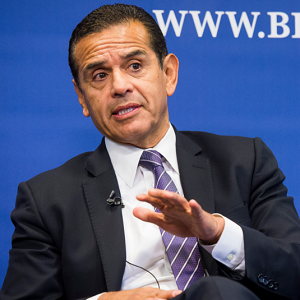ANTONIO R. VILLARAIGOSA
Former Mayor of Los AngelesAntonio Villaraigosa is a Bipartisan Policy Center senior fellow and the former mayor of Los Angeles. He is considered a leading voice and champion of the “radical middle” in American politics. Known for his exceptional skill at building bipartisan coalitions, Villaraigosa draws support from the broad center of both Democratic and Republican voters. It is a unique individual who can serve as the chair of the 2012 Democratic National Convention and also receive standing ovations as the invited speaker at Republican events. Villaraigosa’s appeal is broad, not only because of his independent thinking on national issues, but also because he is a self-made man and an energetic, electrifying communicator.
In 1990, he was appointed to the Los Angeles County Metropolitan Transit Authority, where he worked alongside county supervisors, the mayor of Los Angeles and city council members representing Los Angeles and neighboring cities. Villaraigosa’s friends in labor and local government had long urged him to consider running for public office, and the introduction of term limits to the California state legislature in the 1990s created just such an opportunity. In 1994 he entered the race for an open assembly seat representing much of northeast Los Angeles. Despite opposition from the outgoing assembly member and his allies in Sacramento, Villaraigosa won an upset victory in the primary and was easily elected in the general election.
In 2005, Villaraigosa again sought the office of mayor, this time finishing first in both the primary and the run-off elections. On July 1, 2005, he was sworn in as the 41st mayor of Los Angeles. Although the city was founded under Spanish rule and, along with the rest of California, was part of Mexico until 1848, Villaraigosa was the first person of Latin American descent to serve as mayor since 1872. His election was widely seen as an affirmation of the growing political power of Latinos, not only in Los Angeles and California, but also in the United States as a whole. In 2009, he was easily elected to a second term.
Immediately upon taking office in 2005, Villaraigosa charged head-on at the city’s most intractable challenges, including education, public safety and transportation. He aggressively sought advancements in economic development and the environment. As he had done throughout his career, he built broad coalitions across ideological and ethnic lines.
As president of the U.S. Conference of Mayors, Villaraigosa became a national spokesman for education reform and expanded investment in America’s transportation infrastructure. While term limits prevented Villaraigosa from serving a third term as mayor, his impact on Los Angeles as well as on state and national issues has been unmistakable.



